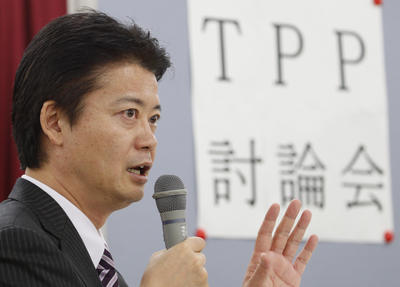Despite this, anti-TPP rhetoric in particular has been problematic. It has been trading on a subtle implication that Japan will be forced to make concessions while other nations maintain their respective status quo(s?). This ignores the fact that the TPP will involve multilateral negotiations where Japan is likely to find many willing partners to balance against the potentially more intrusive aspects of this ‘comprehensive’ partnership.
There is also little awareness that the country’s main sponsor, the US, may well be the biggest obstacle to any eventual TPP deal. The US has traditionally been committed to a certain kind of liberal trade order, but many see it as having a chequered history in its commitment to the liberal political and trade order in general. In fact, there are numerous countries involved in negotiations that are extremely sceptical about any deal negotiated by an American administration.
It is important to remember in this context that Australia signed an FTA with the US which did not liberalise the US agricultural market nearly as much as Australia originally hoped. And due to the same range of interests and stakeholders, a NZ-US FTA is not even a realistic consideration.
Some countries face the additional problem of potentially aggravating their own key political constituencies while trying to meet US requirements. For instance, a wide range of agricultural interests and service-industry associations came out against the TPP in Japan over the last fortnight. And it is not just these sectors that remain unconvinced. Japanese officials beyond the immediate environs of the Ministry of Foreign Affairs, while supportive of TPP negotiations in principle, find the urgency and black-and-white rhetoric of the TPP debate at home, and from abroad, somewhat disconcerting.
Perhaps a cause of such unease is the lack of discussion about the need for rhetorical balance in the broader diplomatic context. Nagashima Akihisa’s comment to the effect that a positive of the TPP would be that China would see the strategic environment aligning against it, are precisely the kind of comments that confuse Japan’s economic and security interests. Australia and New Zealand have already felt the need to caution against such ‘confusion’ in their own cases. In fact top Australian and New Zealand political figures concerned at some of the external rhetoric floating around the TPP in Washington have had to communicate to key figures supporting the TPP in no uncertain terms that the moment NZ and Australia smell a China containment policy, they are ‘gone’ from the negotiations.
What does this all mean for Japan? The signals emanating from the Noda government about the exact meaning of the TPP are somewhat curious. In one simplistic sense, Japan has little to lose from joining negotiations; if it withdraws because the negotiations ultimately conflict with the country’s national interest, it is very unlikely the Japanese will be the only country with such problems. The time scales are also of the order that Japanese agriculture and the government would have ample time to respond to any changes. These sorts of dynamics and time scales have not been well communicated in the Japanese media. Rather, the narrative started with Kan’s concept of a ‘third opening’ for Japan — which now looks to be a somewhat unhelpful over-exaggeration — and the TPP has thus taken on more symbolism in Japan than it perhaps deserves. The partnership could be especially significant for Japan, but there is a long way to go — and the ‘opening’ of Japan will be about much more than the TPP.
There is also the question of whether the TPP’s importance matches that of various other developments in global finance, investment and trade. It has not escaped Japan’s attention that South Korea has already signed an FTA with Europe — and bilateral agreements with the US and Australia appear to be just around the corner. Consequently, South Korea seems only somewhat interested in the TPP.
But for Japan, the negotiations may be a good way to diplomatically placate the US and relieve pressure over the Futenma military-base disagreement. It may also be a valuable way to draw domestic fire away from Japan’s other trade projects, namely, the already signed agreement with India, continued and redoubled trade agreement efforts with the EU and Australia, and the start of discussions with China and South Korea about trade liberalisation. Activities surrounding these trade initiatives have caused almost no ripples of controversy in Japan over the last year or two.
The Japanese concern with China’s rising power as a military actor has certainly become more palpable in the last two years. But ultimately it is important to remember that Japan also fundamentally shares concerns along with New Zealand, Australia and likely many others about the TPP turning into not just an economic hedge against China, but into a larger piece of an explicit and comprehensive ‘anti-Chinese’ project. Trade diversification east and west makes great strategic sense, for different reasons, for Japan. A pragmatic appraisal of Japan’s national economic and security interests should however lead the US to be feel secure enough in its relationship with Japan and recognize that the pursuit of simultaneous trade agreements with key Asian neighbours is actually a very good idea for Japan in terms of how it affects its long-term ability to manage diplomatic, economic and security tensions in East Asia. Japan faces several challenges with regards to the TPP negotiations. Its relationship with the US is under scrutiny, while Japan is also well aware of China’s rising influence and is attempting to determine how it should respond. Ultimately, it appears Japan needs more certainty from its TPP negotiations regarding the nature and effects of such a partnership, and a clearer idea of the role it wants to play within the East Asia region going into the future.
Corey Wallace is a PhD candidate at the Department of Political Science, the University of Auckland.

